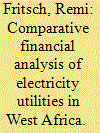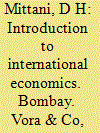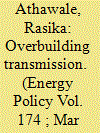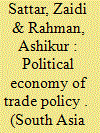|
|
|
Sort Order |
|
|
|
Items / Page
|
|
|
|
|
|
|
| Srl | Item |
| 1 |
ID:
109637


|
|
|
|
|
| Publication |
2011.
|
| Summary/Abstract |
Access to electricity is a major issue in West Africa. Governments have a difficult equation to solve. They naturally seek to offer their people a cheap kWh. But they are constrained by a production based largely on oil and therefore highly volatile production costs. How to fix an acceptable tariff, taking into account the investment needs required to expand the network and increase production? This analysis should provide some answers.
The study presented in this paper provides a financial analysis of electricity utilities in West Africa. It allows a comparison of performances on a number of key financial ratios related to operations (Earning Before Interest Taxes Debt and Amortization/sales, working capital requirement/sales, days of receivables or payables), investment (net fixed assets/gross fixed assets), bank financing (financial structure, debt/EBITDA, interest expense/EBITDA) and economic and financial returns (Return On Capital Employed, Return On Equity).
The conclusion focuses on the growth opportunity that the electricity sector could represent for each country. But this opportunity may only materialize if the EBITDA margins are restored. The available options appear limited and must be assessed taking into account the context of each country: tariff increase, improvement of technical losses or diversification into means of production no longer based primarily on oil or gas.
|
|
|
|
|
|
|
|
|
|
|
|
|
|
|
|
| 2 |
ID:
136234


|
|
|
|
|
| Summary/Abstract |
Net-metering is commonly known as a practice by which owners of distributed generation (DG) units may offset their electricity consumption from the grid with local generation. The increasing number of prosumers (consumers that both produce and consume electricity) with solar photovoltaic (PV) generation combined with net-metering results in reduced incomes for many network utilities worldwide. Consequently, this pushes utilities to increase charges per kW h in order to recover costs. For non-PV owners, this could result into inequality issues due to the fact that also non-PV owners have to pay higher chargers for their electricity consumed to make up for netted costs of PV-owners. In order to provide insight in those inequality issues caused by net-metering, this study presents the effects on cross-subsidies, cost recovery and policy objectives evolving from different applied netmetering and tariff designs for a residential consumer. Eventually this paper provides recommendations regarding tariffs and metering that will result in more explicit incentives for PV, instead of the current implicit incentives which are present to PV owners due to net-metering.
|
|
|
|
|
|
|
|
|
|
|
|
|
|
|
|
| 3 |
ID:
108025


|
|
|
| 4 |
ID:
166309


|
|
|
|
|
| Summary/Abstract |
Electric power distribution network charges have become a popular area of study for regulators, industry and academia. Increasing use of photovoltaics (PVs) and electric vehicles (EVs) by domestic customers has created concerns about the fairness of the current tariff structure. Proposing a tariff design, which will be cost reflective, transparent, sustainable, economically efficient is socially desirable. Wealth transfer through electricity distribution tariffs is a major concern for energy regulators. This paper aims to analyse the current distribution network tariffs faced by four main household customer groups in Great Britain (GB) - defined as those who own a PV and an EV, those with EV but no PV, those with PV but no EV and finally those with neither EV nor PV – under various uptake scenarios for EVs and PVs. We illustrate the impact on household tariffs for the most and least expensive GB network operators, namely London Power Networks and Scottish Hydro Electric Power Distribution. The results show that, due to the current network charges calculation structure, as PV penetration increases, the distribution tariffs increase for all customers regardless of whether someone owns a PV or not. On the other hand, as EV penetration increases, the distribution tariffs decrease for all customer groups. Another key finding is that the distribution tariffs in Great Britain are EV dominated and the future EV and PV penetration projections indicate that the distribution tariffs will likely decrease for all customers in Great Britain.
|
|
|
|
|
|
|
|
|
|
|
|
|
|
|
|
| 5 |
ID:
170350


|
|
|
|
|
| Summary/Abstract |
This paper uses a multi-country input-output model to simulate the impacts of the recent China-U.S. trade war. We first examine in detail the list of products subject to additional tariffs, and then use the model to estimate the economic impacts of the trade conflict. Based on the direct and indirect impacts on the energy sector of each country, we then extend the analysis to the issue of global energy demand. Our empirical results indicate that both China and the U.S. suffer from the conflict, although the impacts on China are greater Both countries experience a reduction in energy demand and a general economic slowdown. Although certain countries may benefit from the China-U.S. trade conflict in short-run, a general negative impact on the global economic prospects can affect all. Moreover, a short-term marginal impact on the global energy market is found, but as the consequence of long-term uncertainties and indirect economic impacts, further reductions of global energy demand are expected.
|
|
|
|
|
|
|
|
|
|
|
|
|
|
|
|
| 6 |
ID:
054454


|
|
|
|
|
| Publication |
Taiwan, Chung-Hua Institution for Economic Resarch, 1996.
|
| Description |
23p.
|
| Series |
Discussion paper series; no.9608
|
| Standard Number |
9579676178
|
|
|
|
|
|
|
|
|
|
|
|
Copies: C:1/I:0,R:0,Q:0
Circulation
| Accession# | Call# | Current Location | Status | Policy | Location |
| 039119 | 382.70951249/BOR 039119 | Main | On Shelf | General | |
|
|
|
|
| 7 |
ID:
026505


|
|
|
|
|
| Publication |
Bombay, Vora & Co, Publishers Pvt Ltd., 1970.
|
| Description |
vi, 300p.
|
|
|
|
|
|
|
|
|
|
|
|
Copies: C:1/I:0,R:0,Q:0
Circulation
| Accession# | Call# | Current Location | Status | Policy | Location |
| 004584 | 337/MIT 004584 | Main | On Shelf | General | |
|
|
|
|
| 8 |
ID:
191222


|
|
|
|
|
| Summary/Abstract |
Policies to substantially increase the amount of renewable energy produced and electrify much of the transportation and industrial sectors to achieve greenhouse gas reduction goals envision an extensive expansion of the transmission system. One set of proposals calls for anticipatory transmission planning, namely, building transmission to regions with the potential to develop renewable energy resources before their actual development. This paper presents a case study of transmission expansion planning in India. Our study finds that it is possible to overbuild the transmission system even in a country that is rapidly developing thermal and renewable resources and has sizeable electricity load growth. Anticipatory transmission planning, high guaranteed returns and weak governance can result in transmission overbuilding. This cautionary finding motivates several recommended public policy reforms to reduce future overbuilds, while supporting economically efficient and environmentally sound transmission development.
|
|
|
|
|
|
|
|
|
|
|
|
|
|
|
|
| 9 |
ID:
115642


|
|
|
|
|
| Publication |
2012.
|
| Summary/Abstract |
Jordan has scarce petroleum resources and hence depends to a large extent on imported crude oil, and natural gas to cover its energy needs and to generate electricity in order to cope with the growing demand. The escalating fuel prices associated with the global economic crisis have negative impacts on the economy of Jordan. However, the availability of renewable energy resources (mainly solar, and wind) supported by well-designed and ambitious incentive schemes that runs in parallel with an energy efficiency program, can contribute positively in solving the current problems. This may result in a dramatic reduction in energy bill cost for both short and long terms. Moreover, it shall result in a better and cleaner environment. In this paper an incentive policy is proposed by the Electricity Regulatory Commission (ERC) based on supporting the installation of PV generating units. ERC plays a major role in this effort which aids decision makers to adopt the proper policies in the electricity sector. It is anticipated that the implementation of this proposed policy will result in a win-win situation for both consumers and government, and will lead to increasing the energy security level in general, and electricity security in particular, within Jordan.
|
|
|
|
|
|
|
|
|
|
|
|
|
|
|
|
| 10 |
ID:
143526


|
|
|
|
|
| Summary/Abstract |
Trade policy within Bangladesh has followed a course of gradual liberalization associated with tariff reduction and rationalization, and removal of protective quantitative restrictions. But the pace of liberalization has varied significantly over different periods depending on the state of the economy or the weight of influence of different actors. To capture this dynamics, in this article, we develop a simple decision theory model to understand how an incumbent government decides upon tariff rationalization strategies. In particular, the role of key stakeholders—consumers, exporters and import substituting industries—is considered, and the collective action issues faced by each group are examined to understand how incumbent governments will respond to their relative influence. Two principle inferences are drawn from this analysis. First, incumbent governments are more likely to facilitate tariff rationalization episodes in times of economic or political crisis. Second, if the economy is not in a state of crisis and consumers suffer from the acutest form of collective action problem, then one can expect that tariff rationalization momentum will be slow or non-existent as long as import substituting industries have equal or more policy clout than exporters. These inferences are then examined in the context of trade policy developments in Bangladesh.
|
|
|
|
|
|
|
|
|
|
|
|
|
|
|
|
| 11 |
ID:
125150


|
|
|
|
|
| Publication |
2013.
|
| Summary/Abstract |
During the War of 1812, American privateers captured more than 1,000 British merchant ships as "prizes." Because privateers were privately owned, and sought profit, not glory, in combat, an obvious question is whether they made money. Perhaps surprisingly, determining the profitability of privateers is difficult. Even early in the war, privateer owners petitioned Congress to make privateering profitable by lowering customs duties. Their complaints led two treasury secretaries to use economic theory to try to understand the economic incentives for privateering. Twice, Congress made decisions guided by competing theories, ultimately lowering customs duties, yet apparently the subsidy did not increase the number of prizes brought into U.S. ports.
|
|
|
|
|
|
|
|
|
|
|
|
|
|
|
|
| 12 |
ID:
159072


|
|
|
|
|
| Summary/Abstract |
This paper, based on data from China after its membership into the World Trade Organization (WTO), shows the co-existence of a fluctuating skill premium and rises in wages for both skilled and unskilled labor. Our research provides one specific factor, the tariff reduction biased toward unskilled labor-intensive sectors, to explain and quantify the magnitudes of skill premium dynamics using the mandated-wage approach. The empirical evidence indicates that sector-biased tariff reductions have widened wage inequality in China through their effect on product prices. World price competition, on the other hand, has contributed to declining wage inequality via product prices, which is consistent with the endowment-based expectations of China's integration into the more skilled-labor abundant world.
|
|
|
|
|
|
|
|
|
|
|
|
|
|
|
|
|
|
|
|
|